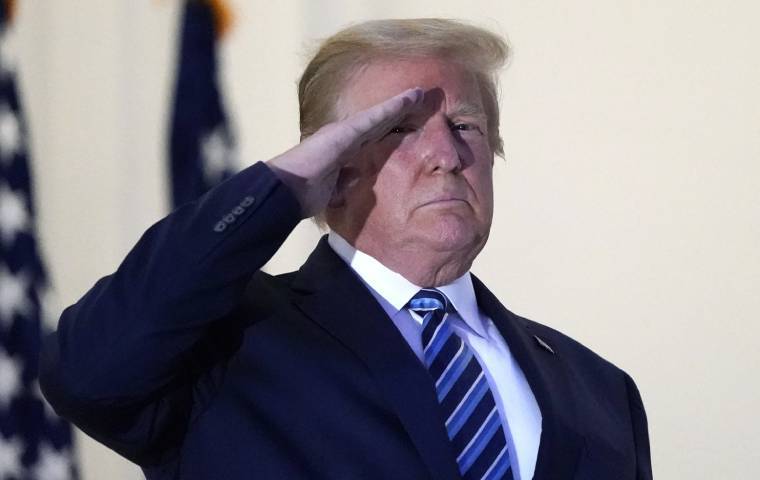In return, Trump is trying to salvage parts of the coronavirus aid
WASHINGTON >> President Donald Trump today tried to salvage some priority items lost in the debris from COVID-19 aid talks, which he himself blew up, and urged $1,200 in stimulus checks Dollars and new aid for airlines and other businesses hard-hit by the pandemic. But it’s not clear he can undo the self-inflicted political damage so close to the election.
In a flurry of tweets, Trump urged passage of those aid packages, a reversal after his abrupt and mysterious move Tuesday afternoon to call off talks with a longtime rival, House Speaker Nancy Pelosi. The California Democrat has consistently turned down such piecemeal requests.
Trump’s tweets amounted to him demanding his way into negotiations he himself had ended. Trump, who drew much political heat for calling off talks, is the steward of an economy whose continued recovery may depend on significant new moves like pandemic jobless benefits. His tweets appeared to move financial markets into positive territory, although it was far from certain they would impress voters demanding more relief.
He asked Congress to send him a “Stand Alone Bill for Stimulus Checks ($1,200)” — a reference to a series of pre-election direct payments to most Americans that had been a key bargaining chip between Pelosi and the White House.
“I am ready to sign immediately. Are you listening to Nancy?” Trump said on Twitter on Tuesday evening. He also called on Congress to immediately approve $25 billion for airlines and $135 billion for the Paycheck Protection Program to help small businesses.
The stock market fell precipitously after Trump called off talks but rebounded today after he floated the idea of piecework aid.
Trump’s decision to call off talks between Treasury Secretary Steven Mnuchin and Pelosi came after the president was briefed on the negotiating landscape — and the backlash a Pelosi-Mnuchin deal would likely have received from his GOP allies in Congress.
“It’s become very clear over the last few days that a comprehensive bill would just get to the point where it wouldn’t have much Republican support at all,” White House Chief of Staff Mark Meadows said on Fox News today. “It was more of a Democrat-led bill that would have been problematic, more in the Senate than the House.”
Pelosi told reporters that “all the president wants is his name on a check” for direct aid payments.
The unexpected turnaround could deal a blow to Trump’s re-election prospects and comes as his administration and campaign are in turmoil. Trump is quarantined in the White House with a case of the coronavirus and the latest opinion polls show he is well behind Democrat Joe Biden with the election in four weeks.
Trump’s withdrawal from the talks came immediately after he spoke to GOP leaders in Congress. Many Republican senators had signaled they were unwilling to join a measure that exceeds $1 trillion, and GOP aides had dismissed prospects for private action. Each nearly $2 trillion deal Pelosi-sponsored increased the potential for a GOP revolt if such a plan came to a vote.
Pelosi and Mnuchin spoke briefly this morning about the chances of a standalone airline rescue, Pelosi spokesman Drew Hammill tweeted. Pelosi pointed out to Mnuchin a measure she tried Friday to rush through at short notice, but only after Democrats made a series of changes Republicans didn’t like.
The talks have been troubled since they began in July and never seemed to result in an agreement that both sides could accept.
Pelosi had called for a variety of Democratic priorities related to food aid, unemployment benefits, help for renters and homeowners, and help for state and local governments. Republicans have accused them of dragging out talks to deny Trump a political victory ahead of the Nov. 3 election.
The first rounds of virus relief came by overwhelming margin as the economy went into lockdown in March. Thereafter, Trump and many of his GOP allies focused on easing social and economic restrictions as the key to recovery, rather than more taxpayer-funded aid.
Still, the decision to halt negotiations now could be politically dangerous. While the stock market scraped back much of its way after the crater in the first few weeks of the crisis, unemployment stands at 7.9% and the nearly 11 million jobs lost since the pandemic began exceed the number the Nation has been dismantling throughout the Great Recession of 2008-09.
The economy has rebounded faster than most economists expected, largely on the back of the $2 trillion stimulus packages Congress approved in March. The $1,200 stimulus checks, additional $600 a week in unemployment benefits, and small business assistance increased household income and enabled many low-income Americans to pay bills and rent and keep up their overall spending , according to data from Opportunity Insights.
But the recovery has slowed and certain sectors such as restaurants, hotels, theaters and airlines remain in poor shape, losing jobs and risking permanent rebalancing. Without further stimulus, economists expect growth to slow significantly in the last three months of the year.
“You’re going to see a pretty significant drag on growth,” said Gregory Daco, chief US economist at Oxford Economics, a consulting firm. It “would really risk a double-dip recession.”


Comments are closed.